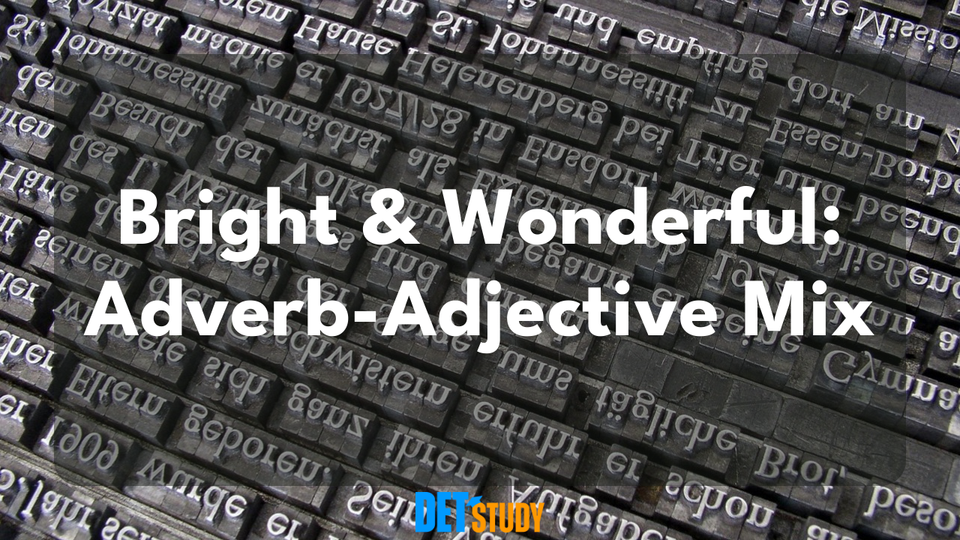"Wonderfully Bright: Exploring Adverb-Adjective Combinations in English Grammar"

Introduction to Adverbs Modifying Adjectives
Adverbs are versatile words that can modify verbs, adjectives, or other adverbs. When they modify adjectives, adverbs usually enhance or restrict the adjective's meaning, providing more information about the quality or intensity of what is being described. Understanding how adverbs modify adjectives can help learners express nuances and details more precisely in their English communication.
Using Your Smartphone as a Second Camera for the Duolingo English TestWhat Is an Adverb Modifying an Adjective?
In a sentence, when an adverb modifies an adjective, it typically provides additional detail or intensity to the adjective. The adverb usually precedes the adjective it modifies, creating a more descriptive expression.
Here are some common adverbs that often modify adjectives:
- Very: This adverb is frequently used to amplify the adjective it precedes.
-
Example: She is very happy with her results.
-
Extremely: An adverb that intensifies an adjective to a greater degree than "very."
-
Example: The dessert was extremely delicious.
-
Quite: This adverb can either soften or strengthen an adjective depending on context.
-
Example: The movie was quite interesting.
-
Too: Used to indicate an excessive degree.
-
Example: The soup is too hot to eat.
-
Fairly and Somewhat: These adverbs suggest a moderate degree.
- Example: The task was fairly simple to complete.
-
Example: She seemed somewhat tired after the workout.
-
Absolutely: Used to express completeness or totality.
-
Example: The view from the mountain was absolutely breathtaking.
-
Really: Can either intensify or simply affirm the adjective.
- Example: I am really excited about the trip.
Position of Adverbs Modifying Adjectives
When positioning an adverb in relation to the adjective it modifies, remember that it typically goes directly before the adjective. This placement ensures clarity and preciseness in communication.
Additional Examples:
- Remarkably intelligent: The student is remarkably intelligent, often surprising teachers with her insights.
- Completely wrong: His assumptions were completely wrong.
- Barely visible: The stars were barely visible through the clouds.
- Totally unexpected: The turn of events was totally unexpected.
By learning how adverbs can modify adjectives, you can enhance your descriptive language skills and add depth to both writing and speaking in English.
Understanding the Role of Adverbs in Sentence Construction
Adverbs play a crucial role in sentence construction, especially when they modify adjectives. By doing so, they provide essential nuances that deepen the meaning of sentences. Here are some noteworthy examples and explanations to help you understand this relationship better:
Try Duolingo TestExamples of Adverb-Adjective Combinations
-
Pretty unusual: When someone says an event was pretty unusual, the adverb "pretty" amplifies the uniqueness of the situation, although in a slightly reserved manner compared to stronger adverbs like "extremely."
-
Incredibly fast: If a car is described as incredibly fast, the adverb "incredibly" elevates the perception of speed, suggesting that it exceeds normal expectations.
-
Particularly difficult: Tasks that are particularly difficult are highlighted with the adverb "particularly," which draws attention to their challenge level, possibly more than other difficult tasks.
-
Slightly better: The phrase slightly better indicates a minor improvement, with "slightly" moderating the degree to which "better" impacts the overall assessment.
-
Surprisingly calm: If someone remains surprisingly calm, "surprisingly" shifts the focus to the unexpected nature of their calmness, implying that a different reaction might have been anticipated.
-
Moderately successful: This combination, moderately successful, uses "moderately" to convey a balanced or average level of success, without any extremes.
-
Ordinarily quiet: Describing a place as ordinarily quiet employs the adverb "ordinarily" to set a baseline expectation, indicating that quietness is typical.
-
Hugely significant: When something is deemed hugely significant, "hugely" emphasizes importance, suggesting substantial impact or value.
-
Especially useful: If a tool is described as especially useful, "especially" marks it as having outstanding utility, possibly more than others in its category.
-
Quite certain: Saying someone is quite certain softens the confidence level slightly compared to "absolutely certain," with "quite" indicating a strong but not unshakeable belief.
Crafting Descriptive Sentences
When integrating adverbs and adjectives into your sentences, consider how the adverb enriches the adjective’s meaning. This nuance can significantly affect a reader’s understanding and the sentence's tone. For instance, compare "The day was hot" to "The day was unbearably hot." The addition of "unbearably" transforms a simple observation into an expressive description of discomfort.
By mastering the subtle interplay between adverbs and adjectives, you can craft more vivid, precise, and engaging sentences in English.

Examples of Adverbs Modifying Adjectives
Adverbs modifying adjectives are an effective way to add depth and detail to your descriptions in English. Below are some examples that illustrate how adverbs can enhance adjectives, making your communication more vivid and precise.
-
Extremely happy: When someone is described as extremely happy, the adverb "extremely" intensifies the sense of happiness, showing that it is at a high level.
-
Fairly common: This combination signals that something is fairly common, with "fairly" suggesting that while it is not rare, it isn't ubiquitous either.
-
Deeply disappointed: To express profound disappointment, you might say someone is deeply disappointed. The adverb "deeply" emphasizes the depth and intensity of the feeling.
-
Immensely popular: If a book or movie is described as immensely popular, it indicates that it enjoys widespread acclaim, thanks to the adverb "immensely."
-
Totally unacceptable: This phrase, totally unacceptable, uses "totally" to express complete disapproval and stress that something is not acceptable by any standard.
-
Nearly impossible: When a task is labeled as nearly impossible, "nearly" implies it is almost beyond one's capabilities, though not completely out of reach.
-
Highly influential: Something or someone highly influential has a significant impact, with "highly" accentuating the degree of influence.
-
Partly cloudy: The term partly cloudy in a weather forecast uses "partly" to describe cloud cover that is not complete, projecting a mixed sky.
-
Shockingly expensive: If an item is shockingly expensive, "shockingly" implies its high cost is surprising or unexpected.
-
Very important: Often used for emphasis, "very" in very important reinforces the crucial nature of something, marking it as vital.
-
Perfectly reasonable: If an argument or explanation is deemed perfectly reasonable, the adverb "perfectly" suggests that it is wholly or completely rational.
-
Slightly annoying: "Slightly" in slightly annoying indicates a mild degree of annoyance, softening the impact of the adjective.
These examples show how the choice of adverb can significantly impact the meaning conveyed by the adjective, allowing for more nuanced and expressive language. Understanding and using adverbs appropriately can greatly enhance clarity and emotive power in both writing and speech.
The Four Most Commonly Broken Rules of the Duolingo English Test (and How to Avoid Them)Common Mistakes with Adverb-Adjective Combinations
-
Misplacing Adverbs: One classic mistake is placing the adverb incorrectly in relation to the adjective. For example, saying "He is perfectly aware of it" is correct, as "perfectly" directly modifies "aware." Placing the adverb elsewhere, such as "He perfectly is aware of it," can confuse the meaning or the sentence's clarity.
-
Overusing Very: The adverb "very" is often overused, leading to weaker expressions. Compare "very important" with stronger alternatives like "crucially important" or "vitally important." Using more precise adverbs can enhance the adjective's impact.
-
Confusing Adverbs with Adjectives: Some learners mistakenly use adjectives instead of adverbs when modifying adjectives. For instance, saying "real good" instead of "really good" is incorrect. Remember, the adverb "really" should be used to modify "good."
-
Inappropriate Intensity: Selecting an adverb that doesn’t match the adjective's intensity can lead to awkwardness. For instance, pairing "slightly" with an adjective like "furious" (e.g., "slightly furious") creates a contradiction because "furious" implies an intense emotion.
-
Using the Wrong Form of Adverbs: Some adverbs do not follow the typical -ly formation rule, leading to misuse. For example, "good" becomes "well" in adverb form, not "goodly." Saying "You did good on the exam" should be corrected to "You did well on the exam."
-
Using “Much” Instead of “Very”: Many learners incorrectly replace "very" with "much" in adverb-adjective combinations. For example, it’s incorrect to say "much beautiful;" the correct form is "very beautiful." "Much" is used with comparatives or past participles, such as "much bigger" or "much admired."
-
Doubling Adverbs: Avoid using multiple adverbs to describe a single adjective, as it can dilute the intended meaning. An example is "most definitely happy," which might overly emphasize and confuse the sentiment. It’s clearer to use one strong adverb, such as "definitely happy."
-
Misinterpreting Gradability: Some adjectives are non-gradable, meaning they cannot be modified by adverbs that suggest degrees, like "barely" or "unusually." For example, "completely empty" works, but "barely empty" contradicts itself, since "empty" implies no contents at all.
With careful selection and placement of adverbs, these common mistakes can be easily avoided, helping you create more precise and articulate sentences. Recognizing these issues will improve both your written and spoken English.
Free Test QuestionsTips for Using Adverbs with Adjectives Effectively
When it comes to using adverbs with adjectives, a few strategic approaches can greatly enhance the clarity and impact of your communication. Here are some tips to guide you:
-
Choose Adverbs that Match the Adjective's Intensity: Consider the strength of the adjective before selecting an adverb. For example: - Use subtle adverbs like "slightly" or "somewhat" with mild adjectives, such as "slightly cold" or "somewhat interesting." - Pair stronger adverbs with intense adjectives, such as "absolutely" with "certain" or "utterly" with "ridiculous."
-
Be Mindful of Gradability: Not all adjectives can be modified by adverbs. Non-gradable adjectives—those that represent absolute states like "perfect" or "dead"—should not be paired with adverbs indicating degrees. Instead, use adverbs like "absolutely" that reinforce the all-or-nothing quality, such as in "absolutely perfect."
-
Avoid Redundancies: Steer clear of adverb-adjective pairings that repeat the same information or shade of meaning. For instance: - "Completely finished" is effective, but "partially half" is redundant.
-
Experiment with Nuanced Adverbs: Sometimes, replacing a common adverb with a more precise one can transform your sentence: - Instead of saying "very nice," you might say "exceptionally nice" for a stronger impression. - Swap "quite difficult" with "incredibly difficult" to convey greater challenge.
-
Use Adverbs to Set the Tone: Adverbs can subtly alter the tone of your sentence. Consider how these options modify the adjective "surprising": - "Mildly surprising" implies a slight surprise. - "Astoundingly surprising" indicates an overwhelming level of shock.
-
Practice Restraint: In many cases, less is more. Using fewer adverbs can lead to stronger and more direct communication. Avoid overloading your sentence with unnecessary adverbs that can dilute the main idea, such as saying "extremely incredibly funny."
-
Pay Attention to Context: Ensure that the adverb and adjective pairing suits the context and subject matter you are discussing. An adverb like "horribly" might be fitting for "horribly messy" in a casual context but may not be as appropriate in professional writing or formal settings.
-
Listen for Sound and Rhythm: Read your sentences aloud to see how the adverb-adjective combinations flow. The rhythm and sound can influence readability and impact. Pairings like "remarkably bright" or "utterly silent" have a smoother cadence that can enhance the reader’s experience.
By implementing these strategies, you'll be able to use adverbs with adjectives more skillfully, resulting in clearer and more engaging writing.
DET Study provides an extensive suite of over 15,000 practice questions, focusing on leveraging adjectives and adverbs to fortify your grammatical skills. Regular practice with these targeted materials ensures that you approach the Duolingo English Test with enhanced confidence and precision, ready to achieve your desired scores.
🎯 Need more practice? Check out DETStudy.com for expert resources, 15,000+ practice questions, and AI-powered writing and speaking feedback.
Frequently Asked Questions (FAQ)
What is an adverb modifying an adjective?
Can you give examples of adverbs modifying adjectives?
Why are adverbs important for modifying adjectives?

